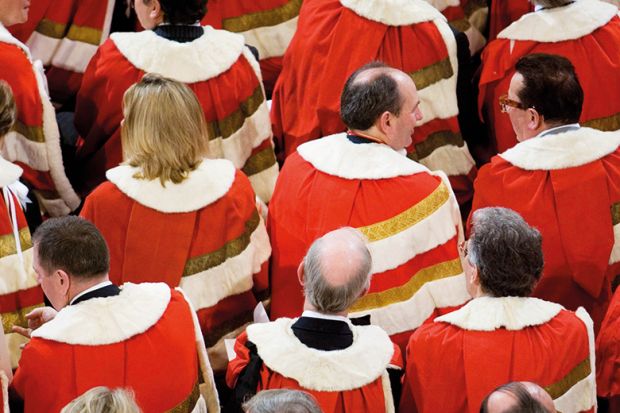Peers have voted in favour of taking international students out of the UK's net migration targets, inflicting a blow to a touchstone policy for the prime minister.
As part of the debate of the Higher Education and Research Bill in the House of Lords, peers backed an amendment from Lord Hannay of Chiswick which stated that “no student…should be treated for public policy purposes as a long term migrant to the UK, for the duration of their studies”.
The amendment was passed by 313 votes to 219 following almost unanimous support from speakers in the upper chamber on 13 March.
Only Lord Green of Deddington, the founder of right-wing pressure group Migration Watch, spoke against the amendment, which was co-sponsored by the University of Oxford chancellor Lord Patten of Barnes, as well as Baroness Royall of Blaisdon and Baroness Garden of Frognal.
The defeat represents a significant rebuke to Prime Minister Theresa May, who as home secretary and as prime minister has repeatedly ignored calls from the higher education sector to remove international students from net migration numbers, which the government has pledged to bring down to the “tens of thousands”.
The policy has been consistently blamed for the tightening of student visa regulations by the Home Office, leading to massive falls in recruitment from key markets. Indian student enrolments in the UK have halved since 2010, while intake of Indian students has rocketed in competitor countries, such as the US, Canada and Australia.
Introducing the amendment, Lord Hannay, a former diplomat, explained that UK higher education had become “heavily overly dependent” on students from China, whose numbers are four times as high as any other country, suggesting the case for the amendment was “unanswerable”.
Baroness Royall of Blaisdon added the argument for removing students from migrant counts was a “no-brainer” given the fixed-term nature of their stay in the UK, saying the “number of overstayers is negligible”.
Changing the policy was required because the Home Office was essentially the “front sales desk” for international applicants to UK universities, yet it had run an “antagonistic website” that deterred some potential students, explained Lord Lucas, a Conservative peer.
For instance, it “refuses visas on unanswerable questions such as ‘what modules do you expect to take’,” he said, saying most students did not know the content of their course until they began their studies.
Passing the amendment would represent a “notable victory” for UK higher education, particularly amid the uncertainty following June’s Brexit vote, added Lord Lucas.
Under the amendment, those who receive an offer to study in the UK shall also “not…be subject to more restrictive immigration controls than were in force for a person in their position on the day this act was passed”.
The amendment passed by peers also says that the secretary of state should have a “duty to encourage international students to attend higher education providers…and UKRI [UK Research and Innovation] must take every possible opportunity to encourage and facilitate the maximum cooperation between British higher education and research establishments and those based outside the UK”, particularly with those involved in EU-funded programmes.
A Department for Education spokeswoman said that the vote was “disappointing” but stressed that the parliamentary process was “ongoing”.
“The proposed amendment would create a situation where we were potentially unable to apply basic visa checks, or impose conditions on a student visa,” the spokeswoman “It would also mean that fresh primary legislation were needed just to make minor, technical changes to immigration rules.”
The amendment will next be considered by MPs, who may choose to accept or reject it. Peers can then try to insist on their original changes, suggest alternative amendments or back down in a process referred to as “ping pong”.
Register to continue
Why register?
- Registration is free and only takes a moment
- Once registered, you can read 3 articles a month
- Sign up for our newsletter
Subscribe
Or subscribe for unlimited access to:
- Unlimited access to news, views, insights & reviews
- Digital editions
- Digital access to THE’s university and college rankings analysis
Already registered or a current subscriber?




